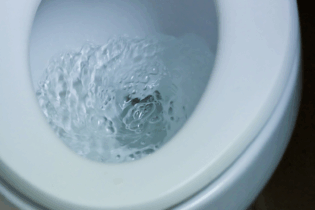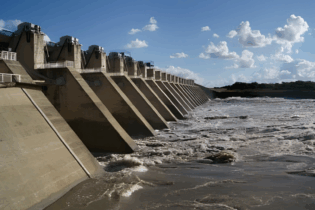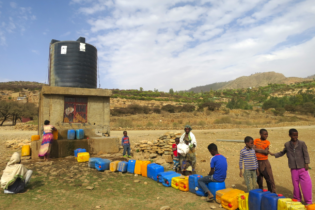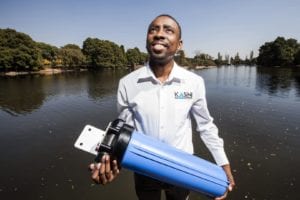
Amaphiko Social Entrepreneur Murendeni, who has developed a water filtration system for use in informal settlements, Johannesburg, South Africa, April 5 2017.
The Kusini Water System, which was recently installed in the community of Extension 10, eMalahleni west, is a containerised, solar-powered water purification solution that uses locally sourced components to provide safe drinking water to communities in rural areas.
The system can treat water from any source, removing over 99.9% of all bacteria and viruses. It can also produce 40 times more water than reverse osmosis, the current best practice, using about half the energy.
The idea behind the system came from one man’s personal pursuit to change the narrative of access to water in rural communities. Murendeni Mafumo, founder of Kusini Water, grew up in Limpopo, a province acutely affected by limited access to safe drinking water, and says the image of young women collecting water from rivers has stuck with him throughout his life. It’s an image and practice he hopes to change.
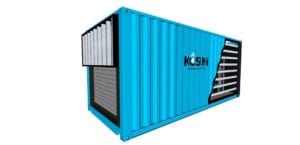
The Kusini Water System is a containerised, solar-powered water purification solution
“I got involved with this issue mainly for personal reasons. The image of young women carrying water on their heads because there was never water at home is something I have carried with me throughout my career working in the big cities. As much as I enjoyed my work, I wanted to do more – I wanted to use my qualifications and skills in areas like the one I grew up in, where people are still dealing with these issues. Even today, when I go back home, it’s still the same image of the young girl collecting and carrying water on her head,” he explains.
To address this issue and provide a sustainable solution, Mafumo had to focus on two key factors: the cost of the infrastructure and the cost of the electricity.
“To tackle these issues, we decided that decentralising the water treatment system would be important, so ensuring that each site is producing water for that particular location and making it modular, meaning that the parts and components change according to the requirements of the location and the quality of the water we are treating. Finally, we opted to add some sort of off-grid power supply; in this instance, we chose to go with solar power, which we supplement with locally available power as a backup.”
Driving down costs
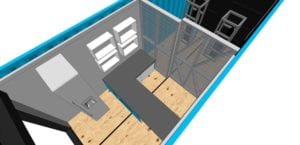
A mock of the interior of the Kusini Water container
This approach, coupled with locally manufactured components, is helping Kusini Water to provide an affordable solution. Mafumo says that the private water utility will be the first black, local producer of this type of technology on a manufacturing scale.
“We are manufacturing these water components and treatment systems locally, which lowers the cost of producing water, in turn lowering the cost of water buying for us, our outlets, our communities and the customers that get water from us.”
Mafumo says the same applies for municipalities. “Municipalities’ costs are somewhere in the region of R3.80 per kilolitre of water produced. Our units are about R3.20 per kilolitre, so the potential cost benefit for municipalities is incredible. With these savings, we see more municipalities coming off the main water grid. We see the same thing for companies as well, especially mining houses and big manufacturing companies looking to reduce their water bill.”
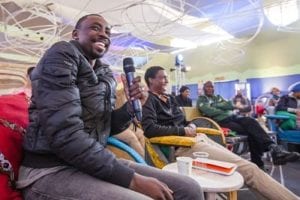
Social entrepreneur, Murendeni Mafumo, during a Q&A session at the Red Bull Amaphiko Academy in Mamelodi, Pretoria East, South Africa on May 21, 2017.
Tried and tested
While Kusini Water may have launched its first mobile system only this month, it has been operating successfully for almost a year. The first Kusini Water system was launched in Shayandima, Limpopo. According to Mafumo, it currently serves 1 000 people.
“We have seen growth averaging 8% month-on-month, even though the location is not in a high-density place. Every day we produce over 60 000 litres of water with our system and we have not received one bad review or any negative feedback since starting operations. We’ve seen how well this system works and how much good it’s doing, which is why we decided to scale up so quickly,” Mafumo explains.
He adds that he envisions 100 000 of these water purification units throughout the entire African continent in the next 15 to 20 years. “Our aim is to build a network of locally owned franchise water businesses.”
Mafumo notes that he could not have reached this point without the support of three organisations. Red Bull has been a major supporter, assisting Kusini Water through its Amaphiko programme, while state-owned innovation enterprise Innovation Up and the University of Johannesburg have provided much-needed financial, scientific and skills support.








